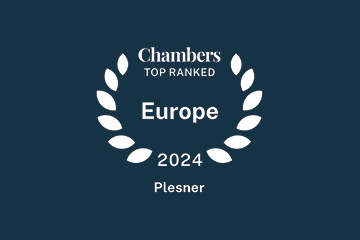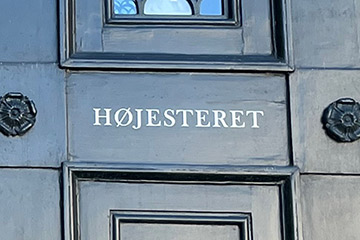Skaugen wins arbitration concerning fuel consumption on ship engines
18 May 2017
In an arbitral award rendered by an ICC-tribunal on 17 May 2017, I.M. Skaugen (Norway) won a significant victory in a dispute with MAN Diesel & Turbo SE (Germany/Denmark) concerning the fuel consumption on marine diesel engines. The arbitral tribunal held that Plesner's client, I.M. Skaugen SE, could rightfully terminate a contract with MAN Diesel & Turbo SE concerning Skaugen's purchase and MAN's sale of two sets of marine diesel engines of the type 6L 48/60B (with related propellers). According to the award, Skaugen could do so as a consequence of the engines having a higher fuel consumption level than warranted by MAN Diesel, because MAN Diesel deliberately manipulated the official tests in order to conceal this, and finally because MAN Diesel subsequently withheld all information about these issues.
Since 2000, Skaugen, a Norwegian shipping company, and MAN Diesel, the world's largest producer of marine diesel engines and part of the Volkswagen Group, had a close collaboration concerning purchase and sale of twelve sets of marine diesel engines (with related propellers) for ships which Skaugen had operated (and still operates) in its fleet consisting of carriers for liquefied natural gas (LNG) or similar gasses.
In the period 2000-2011, MAN Diesel produced and delivered marine diesel engines of the types 48/60A and 48/60B to hundreds of customers worldwide, including Skaugen, and performed official Factory Acceptance Tests (FATs) in order to document the engines' compliance with the contracts (the specifications in the contracts) agreed with the customers. However, in a significant number of cases, MAN Diesel was unable to meet the requirements in respect of fuel consumption, which MDT Diesel had warranted to the customers. Throughout the said period, MAN Diesel therefore deliberately manipulated the FATs for engines so that it looked like the engines met the fuel consumption warranties, which they in reality did not.
It was not until June 2012 that MAN Diesel informed Skaugen about these issues, and even then MAN Diesel only supplied very vague and grossly inadequate information and documentation, including in relation to what impact this had on the specific engines which MAN Diesel had sold to Skaugen since 2000. This was in spite of MAN Diesel's subsequent admission that MAN Diesel's Executive Board had been officially informed of the issues already in February 2009. Thus, more than three years went by from this point before MAN Diesel informed Skaugen, and two years went by before MAN Diesel went to the German authorities in 2011 resulting in MAN Diesel receiving a substantial fine.
The arbitration, which is part of a larger complex of cases between the parties in connection with the mentioned issues, concerned whether or not Skaugen under CISG and German contract law was entitled to terminate the contract for the purchase and sale of two sets of marine diesel engines of the type 6L 48/60B (with related propellers), which MAN Diesel had produced and tested in 2008-2009. During the case, MAN Diesel refused to produce any kind of (valid) evidence concerning the actual fuel consumption of these engines, and witnesses from MAN Diesel's side could either "not remember anything" or refused to answer questions about it. Based, among other things, on technical evidence obtained by Skaugen and other information and documentation obtained despite MAN Diesel's significant opposition, the arbitral tribunal considered it proven that the two engines did have a substantially higher fuel consumption than stated in the official FATs and a substantial higher consumption than the maximum level warranted by MAN Diesel. In addition, the tribunal held that MAN Diesel had fundamentally violated its obligation to loyally disclose to Skaugen all information about the engines in dispute, which Skaugen had a legitimate interest in receiving.
On this basis, the tribunal concluded that Skaugen was entitled to terminate the contract, which Skaugen had done already in 2012, and compelled MAN Diesel to refund Skaugen its down-payment for the engines in the amount of app. EUR 5.3 million as well as reimburse Skaugen for its legal costs and other costs of app. EUR 1.4 million in total, which had been necessitated, i.a., by MAN Diesel's refusal to provide facts in the case.
Plesner (attorney-at-law, partner Peter Schradieck and attorney-at-law Jimmy Skjold Hansen as well as attorney-at-law Henrik Kristensen and assistant attorney Camille Robertsen) represented Skaugen during the case and continues to represent Skaugen in the substantial complex of cases arising from the issues at MAN Diesel.
In the period 2000-2011, MAN Diesel produced and delivered marine diesel engines of the types 48/60A and 48/60B to hundreds of customers worldwide, including Skaugen, and performed official Factory Acceptance Tests (FATs) in order to document the engines' compliance with the contracts (the specifications in the contracts) agreed with the customers. However, in a significant number of cases, MAN Diesel was unable to meet the requirements in respect of fuel consumption, which MDT Diesel had warranted to the customers. Throughout the said period, MAN Diesel therefore deliberately manipulated the FATs for engines so that it looked like the engines met the fuel consumption warranties, which they in reality did not.
It was not until June 2012 that MAN Diesel informed Skaugen about these issues, and even then MAN Diesel only supplied very vague and grossly inadequate information and documentation, including in relation to what impact this had on the specific engines which MAN Diesel had sold to Skaugen since 2000. This was in spite of MAN Diesel's subsequent admission that MAN Diesel's Executive Board had been officially informed of the issues already in February 2009. Thus, more than three years went by from this point before MAN Diesel informed Skaugen, and two years went by before MAN Diesel went to the German authorities in 2011 resulting in MAN Diesel receiving a substantial fine.
The arbitration, which is part of a larger complex of cases between the parties in connection with the mentioned issues, concerned whether or not Skaugen under CISG and German contract law was entitled to terminate the contract for the purchase and sale of two sets of marine diesel engines of the type 6L 48/60B (with related propellers), which MAN Diesel had produced and tested in 2008-2009. During the case, MAN Diesel refused to produce any kind of (valid) evidence concerning the actual fuel consumption of these engines, and witnesses from MAN Diesel's side could either "not remember anything" or refused to answer questions about it. Based, among other things, on technical evidence obtained by Skaugen and other information and documentation obtained despite MAN Diesel's significant opposition, the arbitral tribunal considered it proven that the two engines did have a substantially higher fuel consumption than stated in the official FATs and a substantial higher consumption than the maximum level warranted by MAN Diesel. In addition, the tribunal held that MAN Diesel had fundamentally violated its obligation to loyally disclose to Skaugen all information about the engines in dispute, which Skaugen had a legitimate interest in receiving.
On this basis, the tribunal concluded that Skaugen was entitled to terminate the contract, which Skaugen had done already in 2012, and compelled MAN Diesel to refund Skaugen its down-payment for the engines in the amount of app. EUR 5.3 million as well as reimburse Skaugen for its legal costs and other costs of app. EUR 1.4 million in total, which had been necessitated, i.a., by MAN Diesel's refusal to provide facts in the case.







